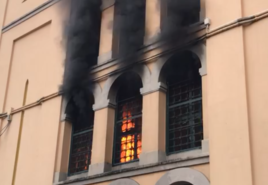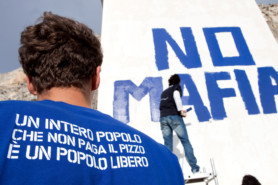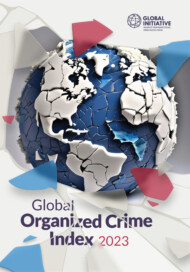In a recent court decision, a former Italian anti-mafia judge has been sentenced to imprisonment. The case raises alarming questions about the independence of the Italian judiciary.
According to the 2023 Global Organized Crime Index, Italy has the dubious honour of being the highest ranked country in Europe, as measured by penetration of mafia-style groups. Its dismal score of 9 out of 10 for this particular category of criminal actor (the Index methodology identifies five) arguably skews the country’s overall criminality average, as measured by the Index.
It should come as no surprise of course that the birthplace of the mafia in the 19th century is still a base today for some of the world’s most influential organized crime groups. At the same time, however, the country’s decades-long commitment to countering organized crime has been central to its political agenda. Italy is lauded internationally for how it has responded successfully to criminal syndicates, and recognized as having among the most sophisticated criminal justice systems in the world for dealing with mobsters.
As the findings of the Index reveal, the Italian state has robust frameworks and mechanisms established to combat organized crime, and, in this, it is one of only a tiny handful of outlier countries that are scourged by above average levels of criminality, but which have simultaneously well-equipped armouries of resilience to resist crime. At 6.46, Italy’s resilience score in the Index surpasses its criminality score, indicating the country’s solid capacity to address organized crime effectively – despite its significant prevalence.
Few figures receive as much respect and admiration in Italy as those dedicated to combating the country’s powerful organized crime syndicates. The Italian state’s anti-mafia work has continued unabated since the tragic assassinations of the Sicilian mafia’s most formidable adversaries, magistrates Giovanni Falcone and Paolo Borsellino, in 1992.
The anti-mafia state apparatus comprises law enforcement, prosecutors and judges, whose exemplary work is demonstrated by the numerous convictions for organized and mafia-related crime that the Italian courts hand down every year. However, this illustrious record has become recently tarnished by an intriguing investigation at the centre of which are a number of individuals who were thought to be the mafia’s adversaries.
In October 2023, former judge Silvana Saguto was convicted for corruption. Saguto began her career as a judge in 1981 and under the wing of Falcone and the anti-mafia pool of judges, quickly became a juridic icon thanks to the role she played in the 1986–1992 Maxi-Trial investigating Cosa Nostra, during which she sentenced the notorious Corleonesi mafia clan boss, Totò Riina, to life imprisonment.
In September 2015 the public prosecutor’s office of Caltanissetta, Sicily, initiated an investigation into alleged wrongdoings by Saguto reaching back to 2010, when she became president of the Department of Preventive Measures, a special court in Palermo with powers to determine to whom properties and other assets confiscated from Cosa Nostra should be temporarily assigned to manage them. Numerous legal professionals were hired to administer sequestered formerly mafia-controlled assets worth millions of euros. A few months later, following journalistic investigations into malfeasance, the then Minister of Justice Andrea Orlando suspended Judge Saguto, who was later forced to resign to enable the Caltanissetta prosecutor’s work to proceed smoothly.
In October 2020 the Caltanissetta court sentenced Saguto and her accomplices, including her husband, to several years’ imprisonment. The prosecution found that through a web of family ties and acquaintances, Saguto engineered a scheme that assigned confiscated assets to a group of individuals in exchange for money, favours and gifts. Saguto, the court found, was the nerve centre of a multi-million-euro fraud, described as a ‘perverse and far-reaching system’. The court described Saguto as the ‘mafia of the anti-mafia’ and her network of accomplices a powerful ‘magic circle’.
Investigators revealed that Saguto’s ‘magic circle’ was not only fraudulently redistributing the confiscated assets of crime – she went further than that by engaging corrupt law enforcement officials to initiate investigations into lawful business owners with a view to seizing their assets. The Italian legal system is based on reversed burden of proof, and Saguto and her magic circle exploited this, triggering investigations into numerous law-abiding entrepreneurs by falsely accusing them of being Cosa Nostra affiliates, a pretext to seize and divert their legitimate assets and businesses worth millions of euros.
After her removal from office, many of her targets had their companies returned, albeit now stripped of their value as a result of years of mismanagement and wrongdoing by the administrators. As a result, hundreds of people have had their enterprises rendered valueless by a predatory anti-mafia front.
In October 2023, the court of Cassation confirmed the decision in the third degree of judgment, sending Saguto to jail for seven years and ten months, a sentence that has certainly shaken the Italian anti-mafia system. This case also illustrates an inherent weakness in the Italian judicial system as a whole and how it is governed. According to the Organized Crime Index, the capacity of the Italian state’s judiciary to enforce judgments on organized crime-related cases with independence and lack of interference is one of Italy’s lowest-scoring resilience indicators. Effectively, this sounds the alarm on how corruption remains potentially a substantial spoiler in how the judiciary functions.
Although, generally, government bodies are not influenced by criminal interests in Italy, corruption still lurks in the corridors of the state machinery, evident in the Saguto case in which the court found collusion between a senior former member of the judiciary and the criminal fraternity.
Exposing corrupt anti-mafia figures has proven to be a source of satisfaction for Italian organized crime groups, and elicited widespread mistrust in the anti-mafia legal apparatus among the public, particularly in Palermo. In the Sicilian capital, 30 years after the murders of Falcone and Borsellino the cynical view held by many members of organized crime groups that their adversaries are no different from them seems to have gained consensus not only in the old strongholds of Cosa Nostra, but also among the progressively minded.
The Saguto case has catalyzed the need for reform on the legislative front. With a new bill in the offing, , momentum is building on the need for more stringent regulations to prevent judges from favouring their associates when designating those responsible for administering the mafia’s confiscated assets. Meanwhile brave efforts by honest investigators and prosecutors to expose corrupt officials and to cleanse the anti-mafia mechanism of undesirable elements are a sign of the state system’s resilience and integrity, and will play a part in restoring public faith in its reputation.
This analysis is part of the GI-TOC’s series of articles delving into the results of the Global Organized Crime Index 2021. The series explores the Index’s findings and their effects on policymaking, anti-organized crime measures and analyses from a thematic or regional perspective.
L’ascesa e la caduta di un eroe antimafia
Una recente sentenza condanna un ex giudice antimafia a più di sette anni reclusione. Il caso solleva interrogativi allarmanti sull’indipendenza della magistratura italiana.
Secondo il Global Organized Crime Index 2023, l’Italia detiene il punteggio più in alto in Europa per la penetrazione di gruppi di stampo mafioso. Il punteggio negativo di 9 su 10 per questa particolare categoria di attori criminali (la metodologia dell’Indice ne identifica cinque) probabilmente influisce pesantemente sulla media delli punteggi di criminalità complessiva del Paese, misurata dall’Indice nel suo complesso.
Il fatto che il luogo di nascita della mafia sia ancora oggi la base per alcuni dei gruppi di criminalità organizzata più influenti al mondo non deve affatto sorprendere. Allo stesso tempo, però, l’impegno nella lotta a tutto campo contro la mafia è stata al centro dell’agenda politica del Paese per decenni, e l’Italia è lodata a livello internazionale per il modo in cui contrasta con successo le organizzazioni criminali. Il sistema di giustizia penale Italiano è tra i più sofisticati al mondo.
Come enfatizzano i risultati dell’Indice, l’Italia dispone di meccanismi efficaci per combattere la criminalità organizzata e, in questo senso, è una delle poche anomalie a livello analitico in cui nonostante vi siano livelli di criminalità superiori alla media, allo stesso tempo il Paese dispone di strumenti di resilienza sofisticati che permettono di contrastarla, e dall’Indice analitico questo emerge.
Poche figure ricevono tanto rispetto e ammirazione in Italia quanto quelle che si dedicano alla lotta contro il crimine organizzato. L’attività antimafia dello Stato italiano cominciò già all’inizio del secolo scorso, ed è proseguita negli anni senza sosta, ancor di più dopo il tragico assassinio di de tra i più temibili avversari di Cosa Nostra, i magistrati Giovanni Falcone e Paolo Borsellino, avvenuto nel 1992.
L’apparato statale antimafia è composto da forze dell’ordine, pubblici ministeri e giudici, il cui lavoro esemplare è confermato dalle numerose condanne per reati di criminalità organizzata che i tribunali italiani emettono ogni anno. Tuttavia, questo illustre primato è stato recentemente minacciato da un’indagine al centro della quale si trovano alcuni individui ritenuti fino a poco tempo paladini dell’antimafia.
Nell’ottobre 2023, l’ex giudice Silvana Saguto viene condannata per corruzione. La Saguto inizia la sua carriera di giudice nel 1981 e, sotto l’ala di Falcone e del pool di giudici antimafia, diventa rapidamente un’icona giuridica grazie al ruolo svolto nel maxi-processo del 1986-1992 a Cosa Nostra, durante il quale condanna all’ergastolo il noto boss del clan mafioso dei Corleonesi, Totò Riina.
Nel settembre 2015 la Procura di Caltanissetta, in Sicilia, apre un’inchiesta su presunti illeciti della Saguto che risalgono al 2010, a suo tempo presidente del Dipartimento Misure di Prevenzione, un tribunale speciale di Palermo con il potere di stabilire a chi assegnare temporaneamente la gestione di proprietà e altri beni confiscati a Cosa Nostra. Numerosi professionisti legali venivano assunti per amministrare i beni sequestrati, un tempo controllati dalla mafia, per un valore di svariati milioni di euro. Pochi mesi dopo, a seguito di inchieste giornalistiche su malaffari, l’allora ministro della Giustizia Andrea Orlando sospende il giudice Saguto, che viene poi costretta a dimettersi per consentire il regolare svolgimento del lavoro della procura di Caltanissetta.
Nell’ottobre 2020 il tribunale di Caltanissetta condanna la Saguto e i suoi complici, tra cui il marito, a diversi anni di reclusione. L’accusa accerta che, attraverso una rete di legami familiari e di conoscenze, Saguto aveva architettato uno schema che assegnava beni confiscati a un gruppo di persone in cambio di denaro, favori e regali. Secondo il tribunale, la Saguto era il centro nevralgico di una frode da milioni di euro, descritta come un “sistema perverso e di vasta portata”. Il tribunale descrive il sistema Saguto addirittura come la “mafia dell’antimafia” e la sua rete di complici come un potente “cerchio magico”.
Dalle carte emerge che il “cerchio magico” della Saguto non si limitava a ridistribuire in modo fraudolento i beni confiscati alla criminalità, ma si spingeva oltre, coinvolgendo funzionari corrotti delle forze dell’ordine per avviare indagini su imprenditori in regola allo scopo di confiscare i loro beni. Il sistema giuridico italiano si basa sull’inversione dell’onere della prova e la Saguto e il suo cerchio magico sfruttavano questo meccanismo, avviando indagini su numerosi imprenditori puliti accusandoli ingiustamente di essere affiliati a Cosa Nostra – un pretesto per sequestrare e sottrarre loro beni e attività legittime per un valore di svariati milioni di euro.
Dopo la sua rimozione dall’incarico, molti dei suoi bersagli si sono visti restituire le loro aziende, anche se ormai svuotate del loro valore a causa di anni di cattiva gestione e di illeciti da parte degli amministratori. Una tragedia annunciata per centinaia di persone che hanno visto le loro imprese distrutte da un sistema antimafia corrotto e predatorio.
Nell’ottobre 2023, la Corte di Cassazione ha confermato la decisione in terzo grado di giudizio, mandando la Saguto in carcere per sette anni e dieci mesi, una sentenza che ha certamente scosso il sistema antimafia italiano.
Questo caso illustra una debolezza intrinseca del sistema giudiziario italiano nel suo complesso e del modo in cui è governato. Secondo l’Organized Crime Index, la capacità della magistratura italiana di eseguire sentenze su casi legati alla criminalità organizzata con indipendenza e assenza di interferenze è uno degli indicatori di resilienza con il punteggio più basso in Italia. Di fatto, questo suona l’allarme su come la corruzione rimanga potenzialmente un sostanziale ostacolo al funzionamento del sistema giudiziario.
Sebbene in Italia gli organi di governo non siano generalmente influenzati da interessi criminali, la corruzione si annida ancora nei corridoi dell’apparato statale, come dimostra il caso Saguto.
In un certo senso, la denuncia di personaggi corrotti dell’antimafia si è rivelata una fonte di soddisfazione per le mafie italiane e ha suscitato nell’opinione pubblica una diffusa sfiducia nell’apparato giudiziario antimafia, soprattutto a Palermo. Nel capoluogo siciliano, a 30 anni dagli omicidi di Falcone e Borsellino, la visione cinica di molti membri dei clan secondo cui i loro avversari non siano poi così diversi da loro sembra aver guadagnato consenso non solo nelle vecchie roccaforti di Cosa Nostra, ma anche nei salotti buoni della città.
Il caso Saguto ha anche catalizzato la necessità di riforme sul fronte legislativo. Con un nuovo disegno di legge in preparazione, c’è dibattito sulla necessità di norme più severe per evitare che i giudici favoriscano i loro associati nell’assegnazione di beni confiscati. Nel frattempo, però, gli sforzi coraggiosi di forze dell’ordine e procuratori onesti per smascherare funzionari corrotti sono un segno di resilienza e dell’integrità del sistema, volti a ripristinare la fiducia dell’opinione pubblica.
Questa analisi fa parte della serie di articoli di GI-TOC che approfondiscono i risultati del Global Organized Crime Index . La serie esplora i risultati dell’Indice e i loro effetti sulla definizione delle politiche, sulle misure contro la criminalità organizzata e sulle analisi da una prospettiva tematica o regionale.



